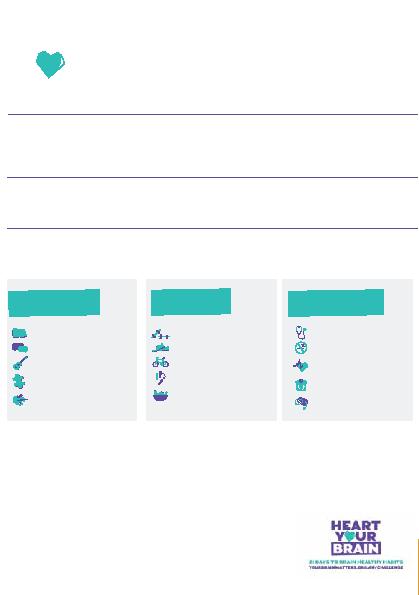
Y UR BRAIN
VISIT WWW.YOURBRAINMATTERS.ORG.AU/CHALLENGE.
CHALLENGE ENCOURAGES
AUSTRALIANS TO START A
NEW ACTIVITY TO LOOK AFTER
THEIR BRAINS, BODIES AND
HEARTS FROM 11 31 MARCH.
It could be a fitness boot camp.
game of chess
serves of vegetables each day
levels
and cholesterol
they are taking positive steps toward brain health.
IS SIMPLE
ONE OR MORE OF THESE SUGGESTIONS PART OF YOUR LIFESTYLE:
AUSTRALIA
Early detection and recognition of dementia enables
more timely access to treatment and social support as
well as enabling people with dementia, their families
and clinicians to plan for the future. It provides people
with a timely opportunity to learn about their condition,
understand changes as they occur and cope with day to
as people age, if the changes are becoming progressively
more obvious and are beginning to impact on everyday
life, an assessment of memory and early intervention is
warranted.
assessment and intervention include:
· Repeated questions and answers
· Frequently losing items and forgetting appointments
· Becoming lost while driving
· Regular problems finding words during conversations
· Feeling overwhelmed or confused by new situations
· Emotional or personality changes
there are a number of other causes of memory loss.
the cause and develop an appropriate treatment regime.
Causes of memory loss include:
· Anxiety/stress/depression
· Dementia of any type (eg; alzheimers disease)
· Medical reasons (stroke high blood pressure,
· Drug and alcohol use
· Vitamin deficiency
Accurate diagnosis is important as some of these
conditions will resolve with appropriate treatment.
service to assess mental and cognitive impairment, provide
an accurate diagnosis and develop an ongoing treatment
plan. tasmemoryclinic provides:
assessment and cognitive testing followed by a further
family/carer and develop a management plan.
· Group Program for those with early stage dementia that
loss such as, anxiety, stress, depression, motivation and
self esteem and assists in the development of skills to
overcome memory difficulties.
· Outpatient Care individual consultations with the
· Referrals to other specialists and services
The Tasmanian Memory Clinic has a multidisciplinary
team approach and is staffed by Old Aged Psychiatrists,
Psychologists.
from www.tasmemoryclinic.com.au or by phoning
03 6247 9960 or fax 03 6247 6439.
and private health insurance generally covers the cost
of services.
this number will grow to almost 900,000 by 2050 substantially increasing the financial and social burdens of
this disorder. It is the third leading cause of death in Australia and the single greatest cause of disability in older
Australians (aged 65+ years). One in four people over the age of 85 have dementia.
are part of the Hobart Clinic Association